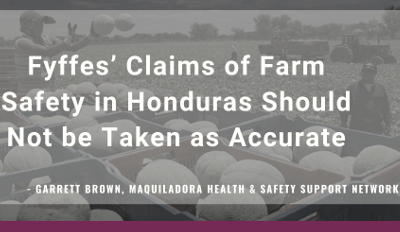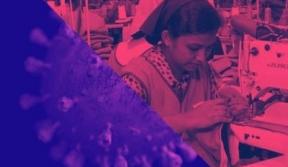
In the ongoing controversy about violations of labor rights and worker health and safety at its suppliers in Honduras, the multinational Fyffes fruit company has told The Progressive magazine “our farms have passed SMETA audits for safety, health, and worker wellbeing.”
This claim by Fyffes should not, and cannot, be taken as good coin, true and accurate.
Sedex, the London-based consulting company that runs the SMETA program, states very clearly in the “FAQs” on its website the following:
- “We do not audit, and we do not certify.”
- “Sedex itself does not specify a particular code or state that suppliers have ‘passed’ or ‘failed’.”
- “Sedex does not set any standards or determine the policy of its members.”
- “The rules of Sedex require members to use their best endeavors to ensure that the information they place on Sedex Advanced is correct. However, we do not verify or validate this information.”
Sedex and its SMETA are part of the multi-billion dollar “corporate social responsibility” (CSR) industry design to protect the brand image and corporate reputations of multinational corporations with global supply chains. In the past 25 years, the CSR industry has failed to improve working conditions in factories, farms and mines while successfully assuring its customers, investors, employees and the news media that “something is being done” to address the illegal and unsafe conditions that the corporations’ own sourcing policies and practices have made inevitable and worse with every contract cycle.
The SMETA program relies primarily on self-reported information from the suppliers themselves about working conditions in their own workplaces. These suppliers have every incentive in the world to hide unsafe, unhealthy and illegal conditions from their buyers.
Some multinational brands hire CSR auditors or “social monitoring” companies to verify the self-reported claims of their suppliers. These auditors also have tremendous conflicts of interest – if they wish to keep their corporate clients they cannot issue relentlessly negative (but accurate) factory reports – so the CSR industry has failed spectacularly to prevent several of the worst industrial disasters in history over the last decade.
For example, CSR auditor Bureau Veritas (and others) conducted multiple inspections of the garment factories in the Rana Plaza building in Dhaka, Bangladesh, and gave a clean bill of health to a building that collapsed in 2013 and killed 1,100 workers in an instant.
CSR auditors trained on the “SA 8000 code” – one of the Sedex SMETA reference codes – inspected the Ali Enterprises garment factory in Karachi, Pakistan, “certifying” that factory as safe in 2012. Three weeks later the building burned down killing 289 workers – 25% of the entire workforce in the “certified safe” factory.
The entire billion-dollar CSR industry is designed to protect corporations – not to protect workers’ health and safety and their legal rights. In fact, the only approach that has been successful in improving working conditions is the direct participation of workers in factory-level safety programs, including health safety committees, where the workers are represented by an organization of their own choosing.
Without the protection of a member-selected union, or similar organization, workers cannot be free of employer retaliation and reprisals, nor likely receive the training, information and paid release time they need to carry out their important tasks of identifying, evaluating and eliminating workplace health and safety hazards.
Fyffes claim that supplier self-reporting and occasional CSR monitoring somehow guarantee safe and legal working conditions is simply preposterous and cannot be taken seriously.
Garrett Brown, MPH, CIH, is Coordinator of the Maquiladora Health & Safety Support Network (MHSSN).

